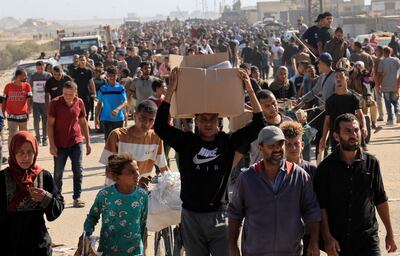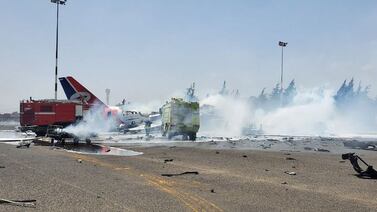Live updates: Follow the latest on Israel-Gaza
Facing starvation, exhaustion and displacement, Palestinians in Gaza are now risking their lives for a box of food. Under a new and highly criticised aid distribution mechanism imposed by Israeli and American authorities, thousands of desperate civilians have been forced to walk miles across treacherous terrain to reach remote distribution points, only to face chaos, humiliation and even death.
In Tel Al Sultan, south-west of Rafah, the first round of aid distribution drew massive crowds on Tuesday. People, many of them displaced and living in tents, walked for hours under the scorching sun to reach one of the few locations where aid was being handed out.
Among them was Eed Abu Muhsain, 33, a mother of five from Al Mawasi, Khan Younis, who lives in a makeshift tent.
“I heard people were heading to get aid, so I followed,” she told The National. “At first, I was afraid, but seeing so many others going gave me the courage.”
After walking a long distance over sand and rough roads to reach the distribution site set up by the US and Israeli-backed Gaza Humanitarian Foundation, she found it disorganised and overcrowded.
“There were only three narrow passages, two for men, one for women. It wasn’t secure or humane. The only thing pushing us there was hunger.”
No identity document was required to collect the aid, she said. The people operating the distribution centre, some speaking Arabic, others appearing to be foreigners, simply handed her a package and sent her on her way.
“I wasn’t searched, but there were surveillance cameras everywhere. Inside the box: a few kilos of sugar, flour, rice, biscuits and some cooking oil, enough for maybe a week.”

On Wednesday, the foundation said it had distributed more than 14,000 food boxes, each of which could feed five to six people for a few days. It denied that people collecting food had been killed or injured at the sites.
Confusion reigned as the aid group appeared to have announced a temporary halt to its activities. The foundation - which has no public website or contact details - later said that was an inaccurate report based on a fake social media account.
The experience of collecting aid was difficult, but for some, it quickly turned deadly.
According to the Gaza Ministry of Health, crowds overwhelmed one distribution point on Tuesday. In an attempt to disperse the crowd, Israeli warplanes opened fire, killing four people and injuring 46 others.
Mohammed Kalob, 43, a father of five, was among those present.
“I didn’t even get to collect aid,” he told The National. “The scene was madness. People stormed the distribution area, and suddenly bullets were flying.”
He added: “There’s no transport, no safety. But what else can I do? My youngest is six. I have nothing to feed them.”
The aid packages, worth an estimated 1,000 to 1,200 shekels (about $280 to $340), contain only basic supplies. Still, for thousands of families, even this is a lifeline.
“If they open the centre again, I’ll go,” Mr Kalob said. “I know it’s humiliating, but I’m a father and my children are hungry.”

While thousands flocked to the distribution sites, many Gazans are rejecting the mechanism, calling it ineffective, dangerous and dehumanising.
Muath Abu Rabee, 35, a father of five from northern Gaza who has been displaced to the Al Nasr neighbourhood of Gaza city, said he refuses to take part.
“This method of delivering aid is a complete failure. Its failure was obvious before it began,” he told The National.
“I’m hungry. My children have nothing to eat. But I won’t humiliate myself by walking to the far south for a box of food.”
According to a map released by the Israeli military, aid supplied by the foundation will be distributed at three sites in the southernmost governorate of Rafah and one in Deir Al Balah in central Gaza, but not in the north.
resident of northern Gaza
Mr Abu Rabee also raised safety concerns, saying that any movement across Gaza carried the risk of detention or interrogation by Israeli forces.
“You can’t trust Israel. This isn’t aid, it’s a trap – a moral and legal crime. It will end up like last year’s floating pier: a failed, shameful stunt,” he said.
He was referring to a short-lived and largely unsuccessful US attempt last year to deliver aid by sea amid strict Israeli controls over land border crossings.
A World Food Programme staff member confirmed that multiple organisations were approached by Israeli and US officials to participate in the latest aid delivery scheme, but all declined.
“We rejected any involvement,” the WFP official told The National. “This scheme doesn’t address hunger, it prolongs it. Gaza needs aid through a trusted, organised humanitarian framework, not one built on military or political interests.”
The anger is not only about logistics. Many see the mechanism as part of a broader strategy to exploit humanitarian needs for control over the population.
Roshdi Ayad, 32, a father of two from Shujaiya, described the process as coercive and dangerous.
“This is not humanitarian. This is psychological warfare. They force people into isolated, desert-like zones under unbearable heat just to get food,” he said.
“If they truly cared, they’d establish safe, accessible distribution centres across Gaza. Instead, they’re herding people like cattle.”












